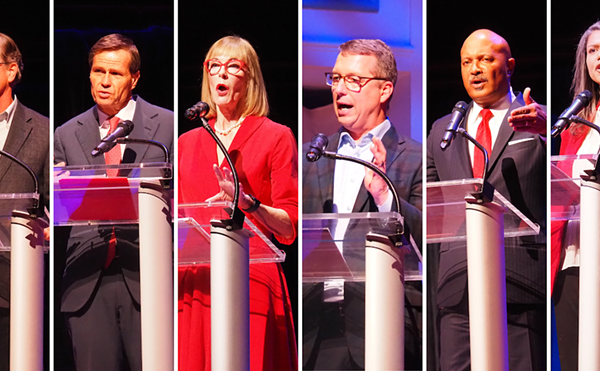They didn’t exactly come riding in on Segways, but the so-called “pretend cops” who guard downtown buildings are dead serious about wanting better pay and benefits
That is why earlier this month many of those security officers, along with the help of the Service Employees International Union (SEIU) Local 1, decided to band together to form a union in the hopes of making working conditions and pay better for all employees.
“I was always taught to stand up for what is right,” says Demarko Payne, a 20-year-old Clifton resident and new father, who works as a security guard at a Talbert House facility in Clifton. “And the union is standing up for what is right.”
About 60 people — including many off-duty security guards — took to the Queensgate offices of Securitas Security Services Inc., the Sweden-based company and Cincinnati’s largest employer of security guards, and demonstrated en masse to demand better pay.
As shown in a union-recorded video posted on YouTube, a Securitas tie-wearing employee opened the company’s Cincinnati office door with a note in hand and directed protestors to call the person whose phone number was written down.
The people gathered were wearing black SEIU “Stand for Security” T-shirts, packed wall-to-wall in the office building’s hallway. The company representative told them that demonstrating is “not the way to do it,” told them to call the person whose contact information was on the note, turned around, walked back into his office, pulled the door shut, was briefly thwarted by a woman pulling the door back open, got it shut and locked everyone out without answering one question being barked by a few protesters.
“They slammed the door in our face,” one person was heard saying on the video.
CityBeat's messages for Securitas officials weren't returned.
“Cincinnati is struggling with poverty, foreclosures and unemployment,” says Melvin Tuggle, a Cincinnati security officer. “The city needs good jobs, and Cincinnati will benefit from us coming together to form a union. Janitors have already proved that this can be done, showing us how the quality of an entire industry can improve when we take a stand together like this.”
Besides seeking better pay, health insurance coverage currently is unaffordable, Payne says. While deciding whether to get the insurance, he took the paperwork to his doctor. The doctor said it wasn’t worth the out-of-pocket expenses and it would be less costly for Payne to pay for health costs on his own as they arise. As a result, Payne is without any coverage.
Security officers say they not only need a living wage and affordable health insurance, but also respect and proper training. Currently they get very little of either, Payne adds. He resists calling himself a “guard” or an “officer.”
“I call us security ‘observationists,’ ” he says. “Or lookouts or scouts.”
In the training employees do receive, they are told they cannot use words like “stop” or “come back here” if they catch someone doing something they shouldn’t be doing. That's because those are “words law enforcement officers use,” he says.
They wear uniforms that somewhat resemble the ones worn by police officers, including a shiny silver badge, but that is where the similarities end. Payne and his fellow first-line-of-defense guards have no two-way radios, no guns, no handcuffs, no bullet-proof vests, no billy clubs, no Tasers, no Mace — nothing. So, they look intimidating but in reality even lack the training to safely and properly stop a teenager from stealing a pack of bubble gum, for example.
Often, especially at the Talbert House, a chemical addiction rehabilitation facility used by the court system to reform the formerly jailed, things can get a little intense. Payne frequently is caught up in a melee.
“The only thing that can help me is running, getting behind a door — if I can open it in time,” he says. “I am told I can detain someone, but I am not told how to do it.”
He worries what will happen if someone pulls a gun on him, because he knows sometimes outpatient clients at Talbert House have been known to bring firearms to meetings.
“I am not trained to know what to do if someone comes at me with a gun,” he adds.
Payne says he “knows” how to detain someone from experiences outside of his professional work — like getting into playground or street fights — but feels bad for his fellow guards who don't even have that type of background and are left to fend for themselves.
Guards who have unionized with SEIU’s help in other cities have received training in suspect detention, building evacuation and anti-terrorism tactics, all things many local guards say they would welcome.
SEIU was the same union that began to help organize downtown office janitors in late 2004, finally successfully securing a contract for the workers in 2007. This was the first-ever contract for that group of workers which, the union says, “…improved hundreds of job and provided affordable healthcare to 1,000 more residents.”
Bolstered by the success, security guards — who start making $8 per hour, or less than $17,000 annually, and aren't awarded raises — would like to form their own union and get some of the same benefits. And they believe that's close to becoming a reality.
Their same-company counterparts in Europe make between $17 and $21 an hour and Securitas pledges on its Web site to want to help create good lives for their employees.
“People who come up in this (line of work) can actually enjoy it as a career,” Payne says. “For me, it’s just a job. But I can’t lose that job, because I need that job.”
A 2009 graduate of Aiken College and Career High School in College Hill, Payne says he thought a job as a security guard fit well with his former role as a leader at his high school. He even considered a career in law enforcement, but now thinks that's unrealistic. It’s probably not a good job, he adds.
“If security guards get treated like this, what do law enforcement get treated like?” he asks.
It doesn’t have to be this way, says Doug Sizemore, executive secretary-treasurer of the Cincinnati AFL-CIO Labor Council, an SEIU affiliate.
“(The security guards) would like to have a voice on their working conditions and they don’t feel like they do right now,” Sizemore says. “We fully support their right to organize. We will stand right with them as they work to get that. I can assure you that.”





